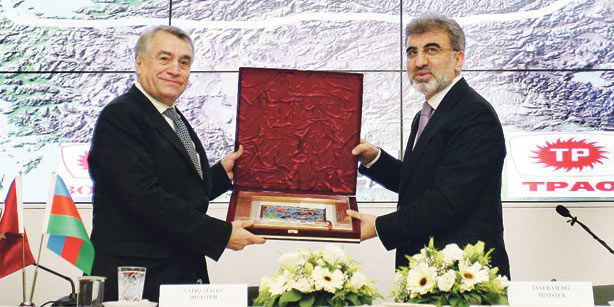
Trans-Anatolia Gas Pipeline: Wider Implications of Azerbaijan’s Project (Part One)
Publication: Eurasia Daily Monitor Volume: 9 Issue: 3
By:

Energy Ministers, Natig Aliyev of Azerbaijan and Taner Yildiz of Turkey, signed on December 26 in Ankara a memorandum of understanding to build a Trans-Anatolia Gas Pipeline to Europe, dedicated mainly to Azerbaijani gas (“Direct Road to Europe: Azerbaijan’s Trans-Anatolia Gas Pipeline Project,” EDM, January 4).
This gas project can become the strategic equivalent of the Baku-Tbilisi-Ceyhan oil pipeline from the standpoint of Azerbaijan’s national development (with a similarly positive side-effect for Georgia). In a wider perspective, tabling this decision as such (even pending implementation) is a game-changer, with multiple ramifications across the space from Ashgabat and Baku to Vienna and Brussels.
• Implications for Nabucco:
The trans-Anatolia project would replace the Turkish section of the EU-backed Nabucco project for Caspian gas to Europe. The trans-Anatolia project, along the same Turkish route, pre-empts the Azerbaijani gas volumes that were expected to supply Nabucco’s first stage and to contribute to its second stage.
Nabucco’s cost overruns (long underestimated by the Austrian-led management) and the European financial crisis further delayed that project, inspiring alternative proposals to transport Azerbaijani gas to Europe. First, British Petroleum proposed replacing Nabucco with an entirely different transportation solution, all the way from the Georgian-Turkish border to Vienna (see EDM, November 1, 2, 3, 2011). Given BP’s influence as operator of the Shah Deniz gas producers’ consortium, its proposal could have eliminated Nabucco in its entirety. The trans-Anatolia project is the second Nabucco-substituting initiative; but it would only replace Nabucco in Turkey, still necessitating a continuation pipeline into EU territory. This would favor a shorter, cheaper Nabucco to be built from the Turkish-Bulgarian border to Vienna, transporting Azerbaijani gas to countries along that route and their direct neighbors.
Baku proposes to examine all existing options for a continuation route from Turkey into Europe, and select the most lucrative option on commercial terms. Azerbaijan is not a partner in the Nabucco consortium (the consortium has only itself to blame for not giving Azerbaijan a stake in this project). Turkey, however, is a Nabucco consortium partner. As such, it favors connecting the trans-Anatolia pipeline at the exit point from Turkey with a shortened Nabucco into central Europe. Thus, Azerbaijani gas arriving via Georgia would no longer enter Nabucco at the Georgian-Turkish border, but would instead flow into a shortened Nabucco pipeline at the Turkish-Bulgarian border (www.1news.az, December 28; Journal of Turkish Weekly, December 27; Hurriyet, December 30).
A shorter and cheaper Nabucco would still need to become “bankable” (eligible for loans) to finance its construction. Investors would require “pre-completion” guarantees (advance guarantees) of a supply flow from the trans-Anatolia pipeline into the abridged Nabucco. In the final instance, such guarantees would largely depend on Azerbaijan as gas producer and transit pipeline owner, if the Shah Deniz and trans-Anatolia projects are implemented as planned.
The trans-Anatolia project does not “kill” the Nabucco project; instead, it can give Nabucco another lease on life and new role. It would result in reducing Nabucco’s length and thus its costs, without necessarily reducing the 10 bcm annual gas flow originally planned for its first stage. In effect, Azerbaijan steps in where Nabucco (or indeed Europe writ large) long failed, to finance the pipeline construction across Turkey. Those gas volumes can still enter Europe through a reconfigured Nabucco, depending on commercial terms.
• Implications for Turkey:
The trans-Anatolia project confirms Turkey’s role as an energy corridor to Europe and intersection of multiple supply routes for Turkey itself.
Scalable from 16 bcm to 24 bcm annually, the trans-Anatolia project can accommodate some volumes from sources other than Azerbaijan, at least during its early years of operation. Turkey would welcome gas volumes from Iraq’s Kurdish region to supplement those from Azerbaijan in this pipeline (Anatolia news agency, December 28).
Apart from the transit, Turkey is committed to importing 6.6 bcm from Azerbaijan annually until 2017, and 6 bcm annually afterward. Azerbaijani gas enters from Georgia at Erzurum in Turkey’s east, but Turkish gas demand is concentrated at the opposite end of the country in the west. Turkey’s imports of Azerbaijani gas are falling short of the contracted volumes. Reaching Turkey’s western cities would enhance security of demand for Azerbaijani gas. Apparently, the agreement on the trans-Anatolia pipeline envisages (separately from transit) direct access for Azerbaijani gas to Turkey’s western cities.
The launch of the Azerbaijan-Turkey project coincides with the Russia-Turkey package deal, signed on December 28, 2011, in Moscow. This allows Gazprom to start its South Stream project to Europe via Turkey’s Black Sea exclusive economic zone. In return, Moscow is apparently softening the terms on some of its gas supply contracts with Turkey. One of those contracts involves 6 bcm of Russian gas annually delivered via Bulgaria to Turkey. That volume is roughly equal with Turkey’s annual entitlement to Azerbaijani gas. Based on this offset, Turkey credibly threatened to discontinue the 6 bcm Russian contract on its expiry in December, unless Moscow softened the terms, which Moscow has apparently done (Hurriyet, Zaman, December 30).
Whether the trans-Anatolia project also involves gas storage in Turkey remains an open question. Some remarks from Azerbaijan at the signing event (see above), about marketing gas in Europe together, may be read as implying some storage in Turkey. It seems fairly clear, however, that this is not a “hub” deal for Turkey at Azerbaijan’s expense, but rather a straight transit project and breakthrough for Azerbaijan toward Europe.




